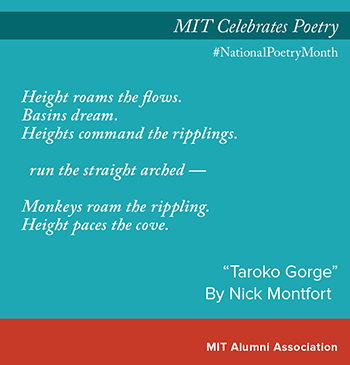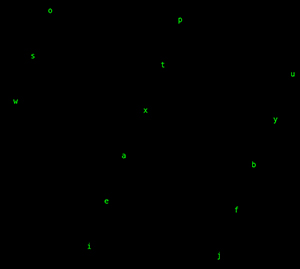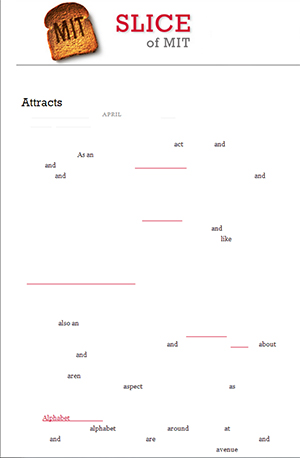Computer-Generated Poetry Liberates Readers, Attracts Coders
-
-
slice.mit.edu
Filed Under
Recommended

“One of the things computers can do more easily than humans is iterate,” explains Montfort. That’s the premise behind his “Taroko Gorge” generator poem. Every 1.2 seconds the poem produces a new line of text based on the rules and predetermined words set out by a JavaScript computer program that Montfort wrote. It’s like computer-generated magnetic poetry.
Line structure is meant to mimic Montfort’s own feelings of exploring the poem’s namesake—Taiwan’s Taroko Gorge National Park. Longer stanzas symbolize wandering the trails while lines with dashes suggest entering the Gorge’s many tunnels where you can’t see to the other side.
The poem is also an open source collaboration—21 poetry coders used Montfort’s program to create their own generative poems. Scott Rettberg’s “Tokyo Garage” is a spoof on what he imagines to be the exciting night life of Tokyo, and J.R. Carpenter’s “Gorge” is about overconsumption and gorging.

“Even if people aren’t doing the work themselves, my hope is it is cognitively liberating,” Montfort says of the participatory aspect of reading a generated poem as it slowly unfolds on a computer screen.
In his “Alphabet Expanding,” a concrete poem generated through the Perl computer language, letters of the alphabet frantically move around the screen, at times raining down sideways and other times dancing. Watch a video of it here. “There are different ways of exploring poetry and language,” says Montfort. Computer-generated poems offer a new avenue to do that.

His Deletionist project designed with Amaranth Borsuk and Jesper Juul is a JavaScript bookmarklet that allows web surfers to convert any webpage into a poem, giving a new perspective on the same webpage text. Such poems are part of an alternate Internet Montfort calls “the Worl.” Listen to Montfort read a page from the Worl here.
By far his most expansive poetry generator, “Sea and Spar Between” written with Stephanie Strickland automatically pulls language from Herman Melville’s Moby Dick and the poetry of Emily Dickinson to create stanzas of new compound words like “bliss disk” or “Loose-fish.” There are 225 trillion stanzas—matching a rough estimate of the world’s sea fish population—and they are numbered with longitude and latitude coordinates. One stanza asks, “And what are you, reader, but a Loose-Fish and a Fast-Fish, too?”
“It’s not supposed to be beyond anyone’s grasp, but it’s also supposed to be a little bit difficult and disconcerting,” he says. Sounds like the quality of any good poem.
Nick Montfort’s work has been showcased on the Alumni Association’s social media channels throughout the month of April along with other alumni-authored poems, haikus, and code compositions as part of National Poetry Month. View a slideshow of poetry excerpts.







